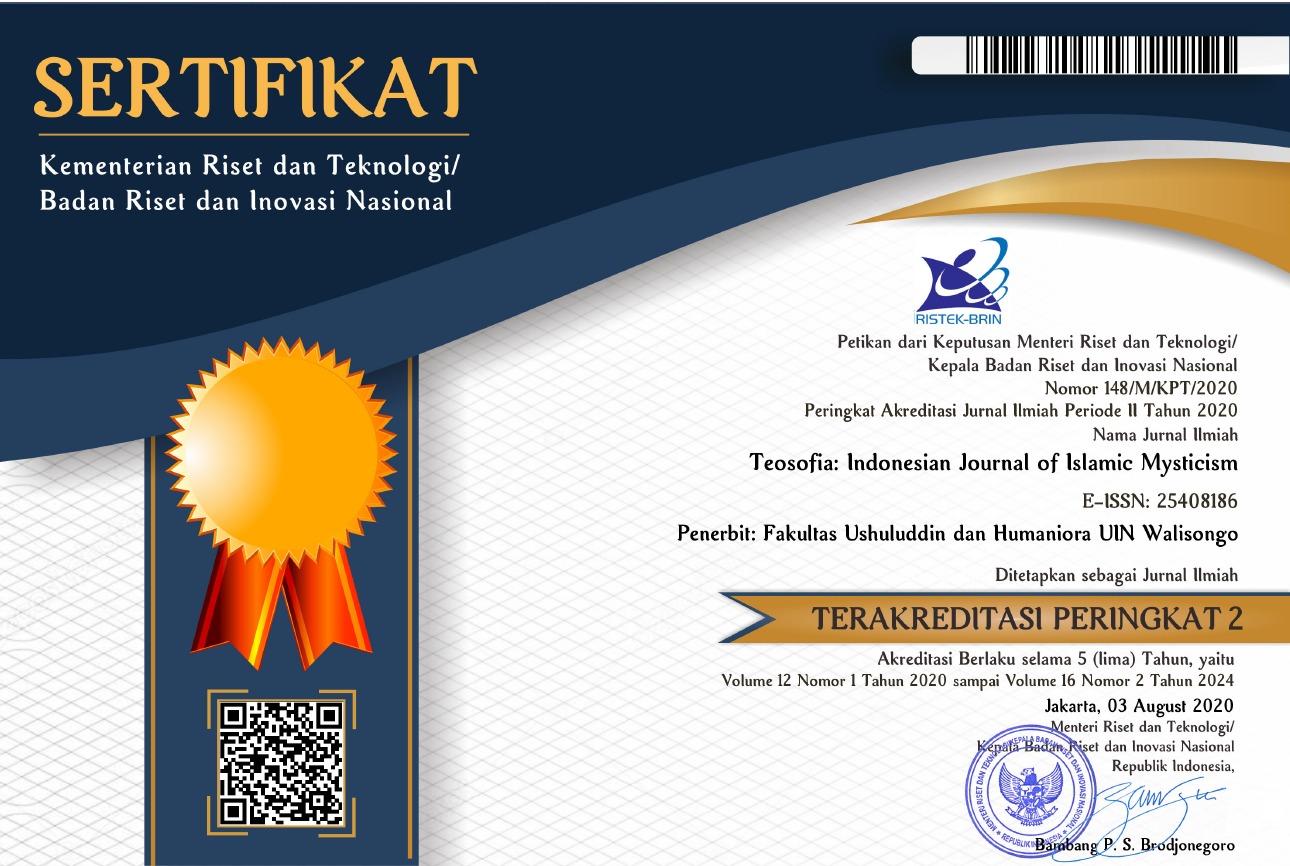Modernism and Crisis: Seyyed Hossein Nasr's Idea on Spiritual Intelligence and Its Relevance Today
DOI:
https://doi.org/10.21580/tos.v12i2.18913Keywords:
Seyyed Hossein Nasr, spiritual intelligence, social education, modernism, crisisAbstract
Modern humans are experiencing various acute crises. Scientific and technological advancements have ironically become a boomerang for humanity, dominating nature and creating a materialistic and hedonistic lifestyle. This study aims to discover Seyyed Hossein Nasr's perspective on spiritual intelligence and the importance of social virtue education in dealing with modern human problems. This qualitative study employs productive interpretation to analyse the data extracted from the main works of Seyyed Hossein Nasr. This study revealed that Nasr's insights shape a fundamental understanding that promotes spiritual awareness within the educational context, encouraging the integration of spiritual values into the social domain. Such integration will create a more just, empathetic, and environmentally conscious society. Nasr's ideas also provide a pathway to address the challenges posed by modernity by returning to spiritual values and adopting a balanced approach to religion and culture.
Contribution: The contribution/urgency that the article gives through this exploration is to shed light on the intricate interplay between spirituality, education, and social values, enriching Nasr's timeless contributions.
Downloads
References
Anggriani, Nendy Maulana, Hasyimsyah Nasution, and Hotmatua Pralihan Harahap. “Konsep Ekosufisme Dalam Perspektif Sayyed Hossein Nasr.” TSAQOFAH 3, no. 6 (2023): 1089–1103. https://doi.org/doi.org/10.58578/tsaqofah.v3i6.1715.
Azwar, Welhendri. “The Resistance of Local Wisdom Towards Radicalism: The Study of The Tarekat Community of West Sumatra, Indonesia.” Pertanika Journal of Social Sciences and Humanities 26, no. 1 (2018): 75–102.
Bakar, Barkathunnisha Abu, Anne Price, Diane Lee, and Erica Wilson. “Spirituality and Pedagogy in Tourism Higher Education: Voices of Tourism Educators.” Journal of Hospitality & Tourism Education 35, no. 1 (2023): 15–29.
Behroozipour, Hossein. “Form, Expression, and Meaning in Persian Miniature Based on the Religious and Mystical Views of Titus Burckhardt and Seyyed Hossein Nasr TT - صورت، بیان و معنا در نگارگری ایران برپایۀ دیدگاههای دینی و عرفانیِ تیتوس بورکهارت و سیدحسین نصر.” Richt-Mbp 3, no. 10 (February 1, 2020): 127–48. https://doi.org/10.30699/PJAS.3.10.127.
Bistara, Raha. “Tariqah Dimensi Esoteris Dalam Islam (Studi Pemikiran Sayyed Hossein Nasr).” Journal of Islamic Civilization 2, no. 2 (2020): 72–79. https://doi.org/doi.org/10.33086/jic.v2i2.1704.
Buzan, Toni. Kekuatan ESQ: 10 Langkah Meningkatkan Kecerdasan Emosional Spritual, Terj. Ana Budi Kuswandani. Jakarta: Pustaka Delapratosa, 2005.
Dodi, Limas. “Nilai Spiritualitas Sayyed Hossein Nasr Dalam Manajemen Pendidikan Islam.” Dirasat: Jurnal Manajemen Dan Pendidikan Islam 4, no. 1 (July 1, 2018): 71–90. https://doi.org/10.26594/dirasat.v4i1.1198.
Irawan, Dedy, and Ahmad Farhan Abdau. “The Problem of Modern Man in Indonesia and Its Solution According to Seyyed Hossein Nasr.” Kalimah: Jurnal Studi Agama-Agama Dan Pemikiran Islam 21, no. 1 (2023): 1–29. https://doi.org/doi.org/10.21111/klm.v20i2.8519.
Khunaeni, Fadhilah. “Spirituality in the Philosophical Thought of Seyyed Hossein Nasr.” Ulumuna 20, no. 2 (December 29, 2016): 373–94. https://doi.org/10.20414/ujis.v20i2.812.
Lopez, Shane J., Jennifer Teramoto Pedrotti, and C.R. Snyder. Positive Psychology. Third Edit., 2016.
Mahsun, Mahsun. “Pandangan Mohammed Arkoun Dan Seyyed Hossein Nasr Tentang Tradisi Dan Modernitas Dan Implikasinya Terhadap Pemikiran Hukum Islam.” Al-Mabsut : Jurnal Studi Islam Dan Sosial 8, no. 2 (2014): 1–26. https://doi.org/doi.org/10.56997/almabsut.v8i2.78.
Majid, Nurcholis. Islam Doktrin Dan Peradaban: Sebuah Telaah Krisis Tentang Masalah Keimanan, Kemanusiaan, Dan Kemodernan. Jakarta: Paramadina, 1992.
Muzammil, Shofiyullah. “Mempertimbangkan Kembali Konsep Tentang Tuhan, Manusia, Dan Aql Dalam Filsafat Al-Kindī Dan Seyyed Hossein Nasr.” TAJDID: Jurnal Ilmu Ushuluddin 17, no. 1 (2018): 1–26. https://doi.org/doi.org/10.30631/tjd.v17i1.44.
Nasr, Seyyed Hossein. A Young Muslim’s Guide To The Modern World. Third Edit. Chicago: KAZI Publications, Inc, 2003.
———. In Search of the Sacred. New York: Sunny Press, 1989.
———. Knowledge and The Secret. Edinburgh: Edinburg University Press, 1981.
———. Pergulatan Sains Dan Spiritual Menuju Paradigma Kosmologi Alternatif. Yogyakarta: IRCiSoD, 2015.
———. Religion and The Order of Nature. New York: Columbia University Press, 1996.
———. The Garden of Truth. San Fransisco: Harper Collins College Publishers, 2007.
———. The Heart of Islam: Enduring Values for Humanity. San Fransisco: Harper Collins College Publishers, 2004.
———. The Need For a Sacred Science. Paris: Curzon Press, 1993.
———. “The Spiritual and Religious Dimensions of the Environmental Crisis.” The Ecologist 30, no. 1 (2000): 18–20.
———. Traditional Islam in the Modern World. New York: Columbia University Press, 1987.
Nietzsche, Friedrich. Twilight of the Idols, or, How to Philosophize with a Hammer. Translate. New York: Penguin Classics, 1990.
Rdojo, T. M. Soerjanto Poespowa, and Alexander Seran. Filsafat Ilmu Pengetahuan: Hakikat Ilmu Pengetahuan, Kritik Terhadap Postivisme Logis, Serta Implikasinya. Jakarta: Kompas Media Nusantara, 2016.
Rezaei Nabard, Amir, and Hasan Bolkhari Ghehi. “Adapting and Analyzing Attitude of Seyyed Hossein Nasr on Art with the Mahmoud Farshchian Works: The Theory of “Transcendental Art ……. Research Paper.” Rahpooye Honar-Ha-Ye Tajassomi 2, no. 4 (2020): 37–48. https://doi.org/http://dx.doi.org/10.29252/rahpooyesoore.5.2.37.
Snijders, Albert. Antropologi Filsafat: Manusia Paradoksal Dan Seruan. Yogyakarta: Kanisius, 2006.
Sururi, Ahmad, Arqom Kuswanjono, and Agus Himmawan Utomo. “Ecological Sufism Concepts in the Thought of Seyyed Hossein Nasr.” Research, Society and Development 9, no. 10 (October 9, 2020): 1–24. https://doi.org/10.33448/rsd-v9i10.8611.
Suteja, M. Sugeng Sholehuddin, and Irfan Hania. “The Value of Social Care Character Education Through Zikir Tarekat Qadiriyah Wa Naqsyabandiyah.” EDUKASIA ISLAMIKA: Jurnal Pendidikan Islam 7, no. 1 (2022): 78–91.
Topik, Topik. “Islamisasi Sains Menurut Seyyed Hossein Nasr.” EDUKATIF 6, no. 2 (2020): 121–31. https://doi.org/doi.org/10.37567/jie.v6i2.312.
Widiyanto, Asfa. “The Reception of Seyyed Hossein Nasr’s Ideas within the Indonesian Intellectual Landscape.” Studia Islamika 23, no. 2 (2016): 193–236. https://doi.org/10.15408/sdi.v23i2.3002.
Zohar, Danah, and Ian Marshall. Spritual Capital: Memberdayakan SC Di Dunia Bisnis, Terj. Helmi Mustofa. Bandung: Mizan, 2005.
Downloads
Published
How to Cite
Issue
Section
License
Copyright
The copyright of the received article shall be assigned to the journal as the publisher of the journal. The intended copyright includes the right to publish the article in various forms (including reprints). The journal maintains the publishing rights to the published articles. Therefore, the author must submit a statement of the Copyright Transfer Agreement.*)
Licensing

This work is licensed under a Creative Commons Attribution-ShareAlike 4.0 International License.
In line with the license, authors are allowed to share and adapt the material. In addition, the material must be given appropriate credit, provided with a link to the license, and indicated if changes were made. If authors remix, transform or build upon the material, authors must distribute their contributions under the same license as the original.
_______
*) Authors whose articles are accepted for publication will receive confirmation via email and send a Copyright Transfer Agreement.








